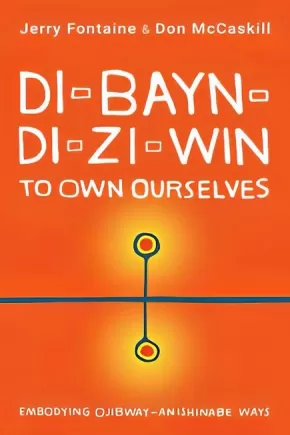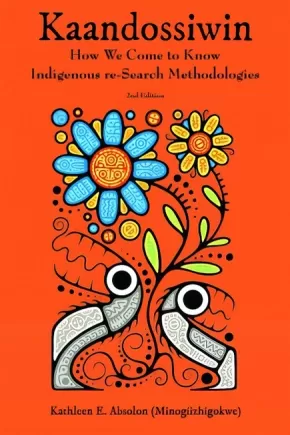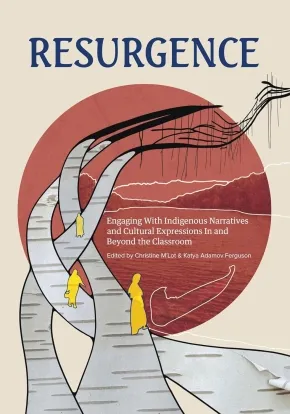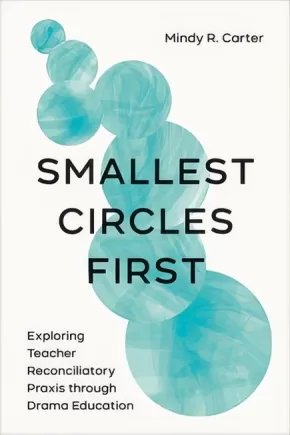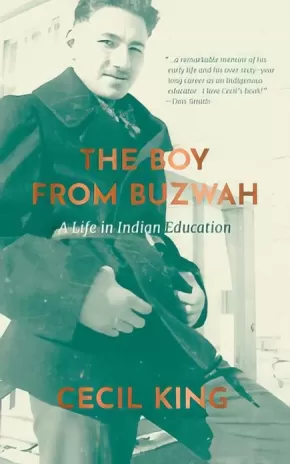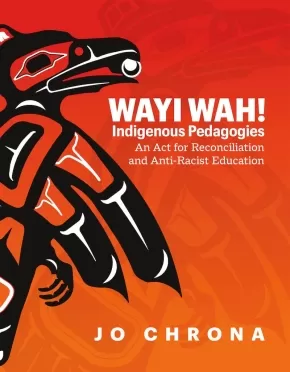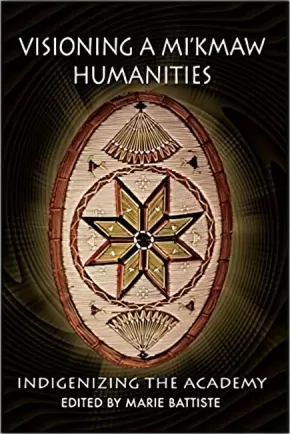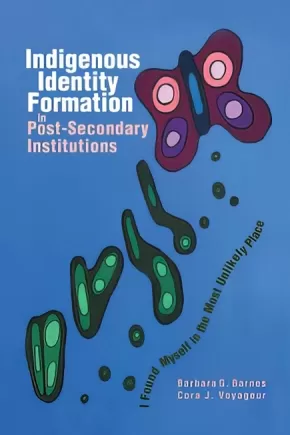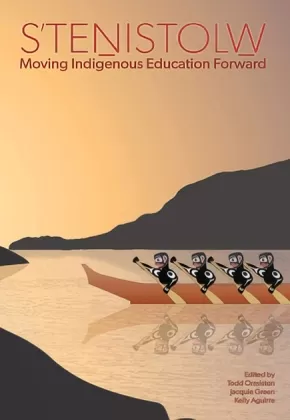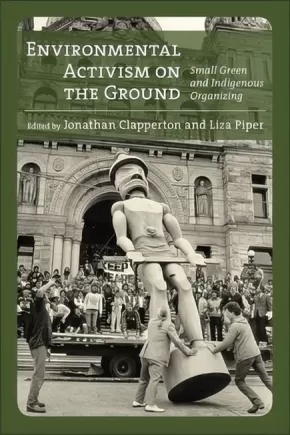Education
Synopsis:
How educators can respond to the Truth and Reconciliation Commission’s Calls to Action
Educators have a special role in furthering truth and reconciliation practices in education, but many struggle to understand exactly what that means and how to accomplish it. Reconciliation through education is grounded in the amplification of Indigenous voices as the spark of authentic reconciliatory practices, as well as the understanding that everyone can gain insights through reconciliation practices and relationships.
Springing from a master’s certificate program at the University of Calgary called Indigenous Education: A Call to Action, this book explores stories from alumni, program designers, and instructors who have taken a deliberate and active role in responding to the TRC’s Calls to Action through education. Section I contains useful chapters on program design and concepts, while section II presents a collection of inspirational and thought-provoking personal stories and reflections from Indigenous and non-Indigenous educators.
This is a resource written by educators for educators wishing to embark on their own journeys of truth and reconciliation in their personal and professional lives. Join the reconciliatory education community in courageously teaching, learning, and acting, just as the educators in this collected volume are doing.
Additional Information
240 pages | 6.00" x 9.00" | Paperback
Synopsis:
The Truth and Reconciliation Commission and Indigenous activism have made many non-Indigenous Canadians uncomfortably aware of how little they know about First Nations, Métis, and Inuit peoples. In Braided Learning, Susan Dion shares her approach to engaging with Indigenous histories and perspectives. Using the power of stories and artwork, Dion offers respectful ways to learn from and teach about challenging topics including settler-colonialism, treaties, the Indian Act, residential schools, and the Sixties Scoop. Informed by Indigenous pedagogy, Braided Learning draws on Indigenous knowledge to make sense of a difficult past, decode unjust conditions in the present, and work toward a more equitable future.
This book is a must-read for teachers and education students. It should also be read by students and practitioners in social work, child and youth counselling, policing, and nursing, or anyone seeking a foundational understanding of the histories of Indigenous peoples and of settler colonialism in Canada.
Reviews
“This book should be in every educator’s library. It serves as a model for educators to learn and teach about the history of Indigenous peoples and settler colonialism without fear or reservation. It is exactly what has been asked for over and over again.”— Tracey Laverty, First Nations, Inuit and Métis Education, Saskatoon Public Schools
"Braided Learning is a safe learning space for people at the start of their learning journey about Indigenous education and history. Each reader will take away the parts of the stories that are important to them, just like listeners do when we hear stories in the lodge from our elders. Nobody tells you what to do – you figure it out yourself with some subtle guidance." — Deb St. Amant, elder-in-residence, Faculty of Education, Queen’s University
"Understanding how educators can participate in reconciliation means understanding what stands in the way. Susan Dion understands both. Highly readable, engaging, and passionate, this book moves teachers from apprehension to action. Educators of all levels, read this book and take heed of Dion’s question: “So what are you going to do now?” — Amanda Gebhard, co-editor of White Benevolence: Racism and Colonial Violence in the Helping Professions
Educator Information
Table of Contents
Introduction: Indigenous Presence
1 Requisites for Reconciliation
2 Seeing Yourself in Relationship with Settler Colonialism
3 The Historical Timeline: Refusing Absence, Knowing Presence, and Being Indigenous
4 Learning from Contemporary Indigenous Artists
5 The Braiding Histories Stories / Co-written with Michael R. Dion
Conclusion: Wuleelham – Make Good Tracks
Glossary and Additional Resources: Making Connections, Extending Learning
Notes; Bibliography
Additional Information
288 pages | 6.00" x 9.00" | Paperback
Synopsis:
A collaboration exploring the importance of the Ojibway-Anishinabe worldview, use of ceremony, and language in living a good life, attaining true reconciliation, and resisting the notions of indigenization and colonialization inherent in Western institutions.
Indigenization within the academy and the idea of truth and reconciliation within Canada have been seen as the remedy to correct the relationship between Indigenous Peoples and Canadian society. While honourable, these actions are difficult to achieve given the Western nature of institutions in Canada and the collective memory of its citizens, and the burden of proof has always been the responsibility of Anishinabeg.
Authors Makwa Ogimaa (Jerry Fontaine) and Ka-pi-ta-aht (Don McCaskill) tell their di-bah-ji-mo-wi-nan (Stories of personal experience) to provide insight into the cultural, political, social, and academic events of the past fifty years of Ojibway-Anishinabe resistance in Canada. They suggest that Ojibway-Anishinabe i-zhi-chi-gay-win zhigo kayn-dah-so-win (Ways of doing and knowing) can provide an alternative way of living and thriving in the world. This distinctive worldview — as well as Ojibway-Anishinabe values, language, and ceremonial practices — can provide an alternative to Western political and academic institutions and peel away the layers of colonialism, violence, and injustice, speaking truth and leading to true reconciliation.
Reviews
"Fontaine and McCaskill write in a way our own Indigenous People can understand and feel; their passion is tangible." — Graham Hingangaroa Smith, Distinguished Professor, Massey University - NZ
"There are multiple ways to inhabit our deepest principles. There are also many ways to honor land and our elders by embodying the teachings of both. Here is life found in kindness, loving, and truth. How do we access healing and how do we share this healing with others? Reading this book is one way. Tears of gratitude are for you both, Jerry Fontaine and Don McCaskill. Mahalo nui no ko ?ike nahenahe. Thank you for this mutual emergence shaped as much by friendship as it is by ?ike kupuna - elder knowledge. What is within these pages are ceremonial gifts offered to all who will take the time to connect with what is inevitable about our collective evolution." — Manulani Aluli Meyer, University of Hawai‘i
Additional Information
328 pages | 6.00" x 9.00" | Paperback
Synopsis:
Indigenous methodologies have been silenced and obscured by the Western scientific means of knowledge production. In a challenge to this colonialist rejection of Indigenous knowledge, Anishinaabe re-searcher Kathleen Absolon describes how Indigenous re-searchers re-theorize and re-create methodologies. Indigenous knowledge resurgence is being informed by taking a second look at how re-search is grounded. Absolon consciously adds an emphasis on re with a hyphen as a process of recovery of Kaandossiwin and Indigenous re-search. Understanding Indigenous methodologies as guided by Indigenous paradigms, worldviews, principles, processes and contexts, Absolon argues that they are wholistic, relational, inter-relational and interdependent with Indigenous philosophies, beliefs and ways of life. In exploring the ways Indigenous re-searchers use Indigenous methodologies within mainstream academia, Kaandossiwin renders these methods visible and helps to guard other ways of knowing from colonial repression. This second edition features the author’s reflections on her decade of re-search and teaching experience since the last edition, celebrating the most common student questions, concerns, and revelations.
Educator Information
Table of Contents
Part One: Preparation For The Search
1) An Introduction to Preparing for Re-Search: Having Tea & Bannock
Re-storying and restoring location
Restoring self: Locating My Self
Decolonizing and Indigenizing My Re-search
Language and Terminology
Chapter Outlines
2) Indigenous Re-Search: Past, Present and Future
Indigenous Peoples’ Cultural History and Research
Oral Traditions and Narrative
Indigenous Knowledge Resurgence: Shifting Landscapes
Trailblazers: Re-searchers and their Searches
3) Colonial Research Trauma My Own Search: A Journey of Making Meaning
4) The Search Trail and Pathway
Part Two: Wholistic Re-Search Methodologies
5) Wholistic Worldviews and Methodologies
6) The Roots: Paradigms, Worldviews and Principles
Paradigms and Worldviews
Principles
7) The Flower Centre: Self as Central
Self
Location
Situate Self in the Search
Memory
Motive and Purpose
Search for Congruency
8) The Leaves: The Methodological Journey
An Organic Process
Travelling
Transformation
Healing
9) The Stem: Backbone and Supports
Critical Consciousness
The Role of Critically Conscious Indigenous Scholars
Indigenous Searchers’ Strengths and Supports
10) The Petals: Diverse Methodologies
Spirit: Protocols, Ceremony and Honour
Heart: Relationships, Reciprocity and Community
Mind: Respecting Indigenous Knowledge
Body: Doing, Working and Creating
11) The Enviro-Academic Context
Fences and Gatekeepers
Allied Theories
The Committee
Writing Oral Traditions and Other Ironies
Thorny Prickly Challenges
12) Indigenist Re-Search Projects and Methodologies: The Last 10 Years
13) Leaving Good Footprints and Winding Down
Additional Information
304 pages | 6.00" x 9.00" | Paperback | 2nd Edition
Synopsis:
A thoughtful guide to critical engagement with Indigenous literatures, perspectives, and teaching methods as well as ideas and action steps for bringing them into the classroom.
Resurgence is an inspiring collection of contemporary Indigenous poetry, art, and narratives that guides teachers in bridging existing K–12 curricula with Indigenous voices and pedagogies. Walk with us along the footbridge which seeks to:
- connect peoples and places
- link truth and reconciliation as ongoing processes
- symbolize the risk and urgency of this work for both Indigenous and settler educators
- engage tensions
- highlight the importance of balance, both of ideas and within ourselves
Through critical engagement with the texts, experienced educators Christine M’Lot and Katya Adamov Ferguson support readers in connecting with Indigenous narratives and perspectives, bringing Indigenous works in their classrooms, and creating more equitable and sustainable teaching practices.
In this resource, you will find
- diverse Indigenous voices, perspectives, and art forms from all across Turtle Island
- valuable concepts and methods that can be applied to the classroom and beyond
- practical action steps and resources for educators, parents, librarians, and administrators
Use this book as a springboard for your own learning journey or as a lively prompt for dialogue within your professional learning community.
Reviews
"Over the past several years, calls have come from across Canada for the inclusion of Indigenous worldviews and knowledge in all levels of education in the country. Enter...Resurgence." ––Windspeaker
Educator & Series Information
For use with K-12 curricula.
Contributors include KC Adams, Charlene Bearhead, Wilson Bearhead, Lisa Boivin, Nicola Campbell, Sara Florence Davidson, David A. Robertson, and Christina Lavalley Ruddy, and more!
Subjects / Themes: Education; Professional Development; Social Science; Indigenous Studies; Language Arts Disciplines; Study Teaching
This book is part of The Footbridge Series. This series aims to bridge curricular outcomes with Indigenous-centered content and perspectives from across Turtle Island. Like a footbridge, this series is intended to provide a path between Indigenous worldviews and the classroom, engaging differences, including tensions, and highlighting the importance of balance, all while helping teachers integrate Indigenous perspectives into multiple disciplines within the K-12 education system.
Table of Contents
Introduction
About This Book
About The Footbridge Series
Part 1: Resistance
Beyond Being Silenced by Sara Florence Davidson
- Connections
Poetry as Cultural Expression by Rita Bouvier
- Connections
T’seka Reflection by Lucy Hemphill
- Connections
Poetry by Louise Bernice Halfe
- Connections
Part 2: Resilience
Mental Health by David A. Robertson
- Connections
Writing as a Therapeutic Medium by Wanda John-Kehewin
- Connections
Birch Bark Technology by KC Adams
- Connections
Images and Health by Lisa Boivin
- Connections
Part 3: Restoring
Stories are Resurgence by Wilson Bearhead and Charlene Bearhead
- Connections
Why am I not on Star Trek? by Sonya Ballantyne
- Connections
Indigenous Spaces by Reanna Merasty
- Connections
Games as Resurgence by Elizabeth LaPensée
- Connections
Part 4: Reconnecting
Poems by Nicola I. Campbell
- Connections
Paths of Tradition by Russell Wallace
- Connections
Let the Children Play by Victoria McIntosh
- Connections
Ethnomathematics and Beading by Christina Ruddy
- Connections
The Contributors
Additional Resources
Index
Additional Information
224 pages | 7.00" x 10.00" | Paperback
Synopsis:
Drawing from studies with pre- and in-service teachers in Quebec, Smallest Circles First looks at how teacher agency engages with the educational calls to action from Canada’s Truth and Reconciliation Commission. Using drama education and theatre, Smallest Circles First explores how the classroom can be used as a liminal educational site to participate in reconciliatory praxis.
Smallest Circles First presents several arts-based educational research examples that illustrate how the arts provide a space for students, teachers, and communities to explore and learn about reconciliation praxis and responsibilities. By implementing arts-based counter-narratives set against settler Canadian history and geography, Smallest Circles First considers the implications of systemic racism, colonization, and political, social, and economic ramifications of governmental policies. Tangible examples from the book showcase how teachers and students can use the arts to learn specifically about their responsibilities in engaging with Canada’s Truth and Reconciliation Commission, in addition to how this work can still meet curricular learning outcomes.
Reviews
"A contribution to the fields of education and performing arts, Smallest Circles First is an excellent example of what can be done and what needs to be done in regards to building a shared future for all Canadians. Readers will feel empathic and identified with these narratives; not just the narratives of the author but also with the narratives of the participants in the research." — Maria del Carmen Rodriguez de France, Assistant Professor of Indigenous Education, University of Victoria
"The research and writing found in Smallest Circles First advances the calls to action in the TRC – in ways that allow space for exploration and in ways that do not insist that there is one ‘true’ way to do the work of reconciliation. This book is as much about hope as it is deep and instructive." — Michele Sorensen, Assistant Professor in the Faculty of Social Work, University of Regina
"Carter’s book provides insightful ways of engaging respectfully and meaningfully with Indigenous topics through drama-based approaches. She describes the work in a way that is thoughtful, ethical, and well grounded. The case studies in Smallest Circles First are diverse and dynamic, and they come together in ways that allow the reader to see the cohesive nature of the book." — George Belliveau, Professor and Head of Language and Literacy Education, University of British Columbia
"Smallest Circles First is a must for any artist or educator, providing research-based evidence of the role theatre can play in healing and reconciliation; her reframing of risk as the grounds for creative rupture is an important corrective to the risk-avoidant perspectives that dominate research and education." — Sheila Christie, Associate Professor of English and Drama, Cape Breton University
Educator Information
Table of Contents
Foreword by Tom Dearhouse
1.Starting with the Smallest Circles First
Teacher Agency, Canada’s Truth and Reconciliation Commission, and the Arts Curriculum
Language, Culture, and Religion in Quebec Education
Are the Arts the Answer?
Vignettes
About This Book
2. Walk a Mile in Someone Else’s Shoes: Situating Theories and Methods
Identity, Subjectivity, and Posthumanism
Arts-Based Educational Research (ABER)
Narrative Inquiry
Vignettes and Constant Comparison for Data Analysis
Making Sense of the Data, Saturation, and Validity
3. We Start Here: Narratives, Vignettes, and Analysis
Narratives
Monologue: I’m Still Canadian, Dad!
Appropriation and Embodiment
Centring Oneself within a Community of Practice
Discussion
4. Weaving Together Understandings across Vignettes
Theme 1: Risk and Learning as Rupture
Theme 2: Belonging
Theme 3: Counter-narratives
5. Full circle
Unfolding’s
Towards an Instructional Model for Belonging and Becoming by Learning through/with Drama
Learning Responsibilities
New Directions: Learning beyond the arts
Coming full Circle
Appendices
Appendix 1: Sing the Brave Song: This Isn’t Over!
Appendix 2: Reconciliation!
Appendix 3: Monologue: I’m Still Canadian, Dad!
Glossary
References
Additional Information
186 pages | 6.00" x 9.00" | Paperback
Synopsis:
Cecil King’s remarkable memoir, from humble beginnings on a reservation to his unparalleled legacy to ensure Indian Control of Indian Education in Canada.
“Through my eyes, my community was creative, innovative and self-sufficient. In this remote northern traditional First Nation society, the skills, knowledge and abilities that the community needed to survive were all there. . . . The stories are not just of survival and hardship but of the power of the human spirit and the sheer natural genius of individuals.” — Cecil King
Cecil King grew up in the small settlement of Buzwah, Ontario, situated on Wikwemikong Unceded Indian Reserve on Manitoulin Island. This moving memoir shares King’s life on reserve in the 1930s and ’40s and describes a vibrant community full of interesting characters who shared knowledge, warmth, affection, and humour. King also describes his experiences attending Buzwah Indian Day School and St. Charles Garnier Residential School.
After furthering his education, King returned home to Buzwah as a teacher. He quickly became disillusioned with the Ontario curriculum and how inadequately it resonated with on-reserve youth and the realities of Indigenous life. It was then that King began his unparalleled legacy to ensure Indian Control of Indian Education in Canada.
King helped create curriculum that connected to traditional Indigenous cultures and established First Nation language courses in elementary and secondary schools. Over the course of his fifty-year career in education, he would found the Indian Teacher Education Program at the University of Saskatchewan, become the first director of the Aboriginal Teacher Education Program at Queen’s University, and develop Ojibwe language courses across North America.
A remarkable story about a remarkable man, The Boy from Buzwah is a powerful testament to Dr. Cecil King’s work and legacy.
Reviews
“A poignant reflective must-read memoir of an Indigenous educator whose life lived was Indigenizing and decolonizing western academies.” —Marie Battiste, author of Decolonizing Education and Honorary Officer of the Order of Canada
“Miigwetch Cecil King, for sharing your remarkable journey and life in this essential book, which educators and learners will treasure. This is a book of extraordinary generosity and humility, and one that provides both context and direction for the future of Indigenous education.” —Jesse Wente, author of Unreconciled
“An essential account of an Indigenous scholar’s trailblazing and sweeping contributions towards restoring and inspiring indigenous control of indigenous education.” —Verna St. Denis, University of Saskatchewan
“Cecil King’s memoir is an important contribution to the Indigenous literature, documenting early life on the Wikwemikong Unceded Indian Reserve, disclosing the enduring roots of Odawa tradition, chronicling the re-emergence of Anishnawbe culture and the rise of Indigenous activism, particularly in the important area of Indigenous education.” —Hon. Leonard S. Tony Mandamin IPC, Justice in Residence, Faculty of Law/Faculty of Native Studies, University of Alberta
“Cecil King has written a remarkable memoir of his early life and his over sixty-year-long career as an Indigenous educator. The teacher, respected community leader, and post-secondary professor and administrator, argues most convincingly for a system of First Nations education that incorporates fully Indigenous history, culture, and present-day realities. I love Cecil’s book!” —Don Smith, Professor Emeritus of History, University of Calgary
"Cecil King's book about his experiences in a day school, residential school, the bureaucracy and institutional development on Indigenous education presents an important perspective in the debate on educational change in the past half-century. His personal perspective and his use of Ojibwe as part of this history introduces a new qualitative dimension to this debate." —Keith Goulet, former Minister of Northern Affairs for Saskatchewan
Educator Information
King was one of the first to create curricula designed for Indigenous children and education programs to train Indigenous teachers and to establish some of the first Indigenous language courses in North America.
King understood that strengthening students’ cultural identity was key to their academic success and saw how the Canadian curriculum was not designed to do this.
Additional Information
356 pages | 5.00" x 8.50" | Paperback
Synopsis:
Extend your learning to explore how racism and bias are embedded in education systems, as well as our own perspectives—and how to create equitable education for all learners.
How can Indigenous knowledge systems inform our teaching practices and enhance education? How do we create an education system that embodies an anti-racist approach and equity for all learners?
This powerful and engaging resource is for non-Indigenous educators who want to learn more, are new to these conversations, or want to deepen their learning.
Some educators may come to this work with some trepidation. You may feel that you are not equipped to engage in Indigenous education, reconciliation, or anti-racism work. You may be anxious about perpetuating misconceptions or stereotypes, making mistakes, or giving offence. In these chapters, I invite you to take a walk and have a conversation with a good mind and a good heart.
With over two decades in Indigenous education, author Jo Chrona encourages readers to acknowledge and challenge assumptions, reflect on their own experiences, and envision a more equitable education system for all. Each chapter includes:
- reflection questions to help process the ideas in each chapter
suggestions for taking action in both personal and professional spheres of influence - recommended resources to read, watch, or listen to for further learning
- personal reflections and anecdotes from the author on her own learning journey
- voices of non-Indigenous educators who share their learning and model how to move into, and sit, in places of unknowing and discomfort, so we can examine our own biases and engage in this work in a good way
Grounded in the First Peoples Principles of Learning, this comprehensive guide builds on Chrona’s own experiences in British Columbia’s education system to explore how to shape anti-racist and equitable education systems for all.
Perfect for reading on your own or with your professional learning community!
Educator Information
Table of Contents
1 Where Do We Begin? Setting Up Our Space in A Good Way
- Situating Ourselves
- An Invitation
- Some Structural Guidance as You Read
- Discomfort: Moving Through the Fear of Making Mistakes
- Taking Responsibility
2 Indigenous Education Is Not Multicultural Education
- Defining Indigenous Education
- Culturally Responsive Education and Beyond
3 Yes, You Have a Role: Reconciliation Through Education
- Our Collective Responsibility
- This Is Not “Just History”; This Is Now
- Colonization Past and Present
- Reconciliation Through Education
- A Vision of a System
4 So, Let’s Talk About the R Word
- Begin With Honesty
- Becoming Anti-Racist in Canada
- Investigating Our Own Biases and Assumptions
- How We Define Racism Matters
- Relational Racism
- Systemic Racism
- Learning and Growing
5 An Indigenous-Informed Pedagogy: The First Peoples Principles of Learning
- Moving From “Learning About” to “Learning From”
- How Were the FPPL Identified?
- What Is Important to Know About the FPPL?
- A Closer Look at Each Principle
- Current Contexts
6 Authentic Indigenous Resources
- Voice and Representation
- Authentic Resource Evaluation Criteria
- Collaborative Development of Local First Nations, Inuit, and Métis Resources
7 A Story of One System: Indigenous Education in British Columbia
- On a Learning Journey
- The Power of Indigenous Advocacy and United Voice
- Government Commitments and Obligations
- Bumpy Paths
8 Now What?
- Next Steps
- Final Thoughts: Working in Relation
References
Additional Information
232 pages | 7.00" x 9.00" | Paperback
Synopsis:
Indigenous Methodologies is a groundbreaking text. Since its original publication in 2009, it has become the most trusted guide used in the study of Indigenous methodologies and has been adopted in university courses around the world. It provides a conceptual framework for implementing Indigenous methodologies and serves as a useful entry point for those wishing to learn more broadly about Indigenous research.
The second edition incorporates new literature along with substantial updates, including a thorough discussion of Indigenous theory and analysis, new chapters on community partnership and capacity building, an added focus on oracy and other forms of knowledge dissemination, and a renewed call to decolonize the academy. The second edition also includes discussion questions to enhance classroom interaction with the text. In a field that continues to grow and evolve, and as universities and researchers strive to learn and apply Indigenous-informed research, this important new edition introduces readers to the principles and practices of Indigenous methodologies.
Reviews
"Reading this second edition is like visiting with a dear friend, over a cup of tea, to recount stories, teachings, and insights. When the visit is over the friends depart after telling many favourite and new stories. In this telling and listening, the friends strengthen and stretch their bonds. With this visit, they learn powerful new teachings and are inspired with deeper research insights about doing Indigenous methodologies in good ways." ~Jo-ann Archibald Q’um Q’um Xiiem, Professor Emeritus of Educational Studies, University of British Columbia
"Writing to teach others about Indigenous knowledge requires authors to build a relationship with the reader. Margaret Kovach invites us to join her in conversation about Indigenous methodologies – accepting her invitation has helped to strengthen my own understanding and relationship with the theory and practice of Indigenous research. "~Shawn Wilson, author of Research Is Ceremony: Indigenous Research Methods
Educator Information
Subjects: Indigenous Studies, Education
Table of Contents
Prologue
Introduction
Part I
Chapter 1 - Indigenous Methodologies and Qualitative Inquiry
Chapter 2 - Indigenous Conceptual Framing in Indigenous Methodologies
Part II
Chapter 3 - Epistemology and Research: Centring Tribal Knowledge
Chapter 4 - Indigenous Ethics and Axiology: Miýo (A Good Way)
Chapter 5 - Engaging the Community
Chapter 6 - Situating Self, Culture, and Purpose in Indigenous Methodologies
Part III
Chapter 7 - Indigenous Theorizing
Chapter 8 - Story and Method in Indigenous Methodologies
Chapter 9 - Interpretation and Working with the Findings
Chapter 10 - Mobilizing the Findings: Representation, Oral Dissemination & Giving Back
Part IV
Chapter 11- A Call to Decolonizing the Academy
Concluding Thoughts
References
Additional Information
328 pages | 6.00" x 9.00" | Second Edition | Paperback
Synopsis:
Literatures, Communities, and Learning: Conversations with Indigenous Writers gathers nine conversations with Indigenous writers about the relationship between Indigenous literatures and learning, and how their writing relates to communities.
Relevant, reflexive, and critical, these conversations explore the pressing topic of Indigenous writings and its importance to the well-being of Indigenous Peoples and to Canadian education. It offers readers a chance to listen to authors’ perspectives in their own words.
This book presents conversations shared with nine Indigenous writers in what is now Canada: Tenille Campbell, Warren Cariou, Marilyn Dumont, Daniel Heath Justice, Lee Maracle, Sharron Proulx-Turner, David Alexander Robertson, Richard Van Camp, and Katherena Vermette. Influenced by generations of colonization, surrounded by discourses of Indigenization, reconciliation, appropriation, and representation, and swept up in the rapid growth of Indigenous publishing and Indigenous literary studies, these writers have thought a great deal about their work.
Each conversation is a nuanced examination of one writer’s concerns, critiques, and craft. In their own ways, these writers are navigating the beautiful challenge of storying their communities within politically charged terrain. This book considers the pedagogical dimensions of stories, serving as an Indigenous literary and education project.
Educator Information
Educators teaching Indigenous literatures will be interested in this book as a resource / topical.
Introduction addresses controversies such as appropriation and debates around authors such as Joseph Boyden gives Indigenous writers an opportunity to address direct questions around why writing matters to them and their communities.
Table of Contents
Acknowledgements
Introduction: Writing-in-Relation
“Being able to tell stories from the North” / A Conversation with Richard Van Camp
“It starts from a place of knowledge and truth” / A Conversation with David Alexander Robertson
“I realized that I could write what I see” / A Conversation with Katherena Vermette
“It comes back to relationship” / A Conversation with Warren Cariou
“That’s the purpose of story” / A Conversation with Lee Maracle
“I hope my writing can help others” / A Conversation with Sharron Proulx-Turner
“Indigenous literatures matter” / A Conversation with Daniel Heath Justice
“A beautiful bomb” / A Conversation with Tenille Campbell
“To write myself back into visibility” / A Conversation with Marilyn Dumont
Conclusion: Listening to Writers
Notes
Bibliography
Additional Information
200 pages | 6.00" x 9.00"
Synopsis:
Since the Renaissance, liberal education has as its core tradition a Eurocentric multidisciplinary humanism — the study of literature, art, philosophy and history — grounded in ancient Greek and Latin texts.
In what may be termed cognitive imperialism, the academy has largely ignored Aboriginal perspectives of humanity. In this volume, Mi'kmaw and non-Mi'kmaw scholars, teachers and educators posit an interdisciplinary approach to explicate and animate a Mi'kmaw Humanities.
Drawing on the metaphor of a basket as a multilayered metaphor for engaging postsecondary institutions, these essays reveal historical, educational, legal, philosophical, visual and economic frameworks to develop a knowledge protocol that can direct, transform and enrich conventional Humanities within the complex dynamics of territory, energy, stewardship, alterity and consciousness.
Additional Information
300 pages | 6.00" x 9.00" | Paperback
Synopsis:
A new model of Indigenous identity formation in Canadian postsecondary institutions
What role does postsecondary education play in the formation of Indigenous identity? Some argue that this impact must be negative, not only because postsecondary education draws students away from their communities, but also because of the Eurocentric worldviews that dominate most institutions. However, according to a ground-breaking study by Barbara Barnes and Cora Voyageur, the truth is much more nuanced and surprising.
During their research, Professors Barnes and Voyageur followed 60 Indigenous students from a variety of backgrounds at six postsecondary institutions in western Canada, and they present their findings here. They explore how the students’ experiences fit with conventional and Indigenous identity-formation theories, and they consider the impacts of colonization and the Indian Act.
Based on the experiences of the students, Barnes and Voyageur build an entirely new model of Indigenous identity formation in Canadian postsecondary institutions.
Additional Information
144 pages | 6.00" x 9.00"
Synopsis:
In 1867, Canada’s federal government became responsible for the education of Indigenous peoples: Status Indians and some Métis would attend schools on reserves; non-Status Indians and some Métis would attend provincial schools. The chapters in this collection – some reflective, some piercing, all of them insightful – show that this system set the stage for decades of broken promises and misguided experiments that are only now being rectified in the spirit of truth and reconciliation. The contributors individually explore what must change in order to work toward reconciliation; collectively, they reveal the possibilities and challenges associated with incorporating Traditional Knowledge and Indigenous teaching and healing practices into school courses and programs.
Reviews
"This book provides innovative reflections on long-standing issues in Indigenous education in Canada and suggests possible pathways to address the educational debt that Canada owes Indigenous peoples. I recommend it to educators, students, and administrators, to anyone interested in learning about the history of residential schools, and to all readers who are interested in reconciliation and decolonisation." — Valentina de Riso, Nottingham Trent University, British Journal of Canadian Studies
"There is no doubting the importance of the subject tackled by this edited collection... In eleven highly diverse chapters, plus a substantial introduction by editor Sheila Carr-Stewart, this collection seeks to shed light on the mechanisms of educational exclusion and sound out the prospects for a different kind of education in the future." — Mark Fettes, Simon Fraser University, University of Toronto Quarterly
"Readers who are new to the topic, such as practicing teachers who wish to enhance their responsiveness to Indigenous students or undergraduate history majors, will gain accessible historical and policy context, alongside complex and nuanced representations of the challenges that pervade Indigenous education today." — Heather E. McGregor, Historical Studies in Education
"Knowing the Past, Facing the Future is critical reading for those invested in Indigenous education, as all Canadians ought to be. By confronting colonialism and racism as they intersect with reconciliation, the contributors of this collected work address the role and responsibility of education in decolonizing a society. I recommend this book be read by all educators."— Margaret Kovach, author of Indigenous Methodologies: Characteristics, Conversations, and Contexts
"New and seasoned readers to Indigenous education in Canada will value how the authors tackle old issues in new ways, uncover challenges that have been ignored, and present innovative possibilities that learn from the past for a much better future."— Jo-ann Archibald (Q’um Q’um Xiiem), co-editor of Decolonizing Research: Indigenous Storywork as Methodology
"This must-read collection of essays provides needed historic reflections on treaties and Indigenous peoples’ aspirations for education, and much needed insight, support, and research to address the reconciliation agenda and correct the longstanding educational debt owed Indigenous peoples."— Marie Battiste, author of Decolonizing Education: Nourishing the Learning Spirit
Educator Information
Contributors: Jonathan Anuik, Michael Cottrell, Karlee D. Fellner, Rosalind Hardie, Darryl Hunter, Harry Lafond, Solange Lalonde, Brooke Madden, Yvonne Poitras Pratt, Jane P. Preston, Larry Prochner, Noella Steinhauer
Additional Information
312 pages | 6.00" x 9.00" | Paperback
Synopsis:
S’TENISTOLW is a SENĆOŦEN term referencing the concept of ‘moving forward’. This book highlights both the doing and being of Indigenous education. Authors share their knowledge on the themes of: Land-Based Learning; Supporting Learners; Indigenization; and Strengthening Alliances. Keynote writings by renowned Indigenous scholars Gregory Cajete, Graham Hingangaroa Smith, Linda Tuhiwai Smith and Kathy Absolon are intertwined throughout the book.
Reviews"
"This book is like a visit home, to talk with the wisest people you know on your reserve or in your neighbourhood. There is an intimacy in how each author shares their own stories of hope, insight and resilience. You will be nourished, strengthened, and inspired. You may be even gently chastised as you read about how Indigenous ways of learning are gaining ground in the educational settings around us. If you enjoy such visits you will treasure this book." — John Borrows, PhD, Canada Research Chair in Indigenous Law, University of Victoria
"S’TENISTOLW is a wonderful feast of stories, experiences, teachings, and approaches of educational and community leaders involved in Indigenous post-secondary education. Practitioners-scholars-leaders receive gifts of hope, inspiration, and transforming potential to live Indigenous education in good ways through innovative Indigenous pedagogies, relational theories, authentic community and land-based programs, and critical engagement." — Jo-Ann Archibald, PhD, Professor of Educational Studies, University of British Columbia
"I can’t wait to share this book! It offers timely and pivotal insights from leading theorists and practitioners about the transformational project of “Indigenizing” the academy and other institutions. I’m sure it will serve educators, students and community members alike as we think through complex questions of transformative, Indigenous knowledge production and education." — Kim Anderson, PhD Canada Research Chair in Indigenous Relationships, University of Guelph
Additional Information
166 pages | 6.00" x 9.00"
Synopsis:
Environmental Activism on the Ground draws upon a wide range of interdisciplinary scholarship to examine small scale, local environmental activism, paying particular attention to Indigenous experiences. It illuminates the questions that are central to the ongoing evolution of the environmental movement while reappraising the history and character of late twentieth and early twenty-first environmentalism in Canada, the United States, and beyond.
This collection considers the different ways in which Indigenous and non-Indigenous activists have worked to achieve significant change. It examines attempts to resist exploitative and damaging resource developments, and the establishment of parks, heritage sites, and protected areas that recognize the indivisibility of cultural and natural resources. It pays special attention to the thriving environmentalism of the 1960s through the 1980s, an era which saw the rise of major organizations such as Greenpeace along with the flourishing of local and community-based environmental activism.
Environmental Activism on the Ground emphasizes the effects of local and Indigenous activism, offering lessons and directions from the ground up. It demonstrates that the modern environmental movement has been as much a small-scale, ordinary activity as a large-scale, elite one.
Reviews
"Environmental Activism on the Ground succeeds splendidly in complicating and enriching our understanding of modern environmentalism. Focusing on Indigenous and non-Indigenous activists in an impressive range of settings, Jonathan Clapperton and Liza Piper draw together and interpret diverse methodological and conceptual insights in a way that gives new, deserved prominence to those who have strived—and continue to strive—for environmental justice at the local level. These accounts left me both enlightened and heartened. Scholars from across the humanities and social sciences will welcome this volume." - Richard A. Rajala, Department of History, University of Victoria.
Educator Information
Table of Contents:
Illustrations
Acknowledgments
Introduction: In the Shadow of the Green Giants: Environmentalism and Civic Engagements - Jonathan Clappeton & Liza Piper
Part 1: Processes and Possibilities
1. Strategies for Survival: First Nations Encounters with Environmentalism - Anna J. Willow
2. Native/Non-Native Alliances: Challenging Fossil Fuel Industry Shipping at Pacific Northwest Ports - Zoltán Grossman
3. Conserving Contested Ground: Soverigenty-Driven Stewardship by the White Mountain Apache Tribe and the Fort Apache Heritage Foundation - Jon R. Welch
4. From Southern Alberta to Northern Brazil: Indigenous Conservation and the Preservation of Cultural Resources - Sterling Evans
5. Parks For and By the People: Acknowledging Ordinary People in the Formation, Protection, and Use of State and Provincial Parks - Jesica M. DeWitt
Part 2: Histories
6. Alternatives: Environmental and Indigenous Activism in the 1970s - Liza Piper
7. Marmion Lake Generating Station: Another Northern Scandal? - Tobasonakwut Peter Kinew
8. Environmental Activism as Anti-Conquest: The Nuu-chah-nulth and Environmentalists in the Contact Zone of Clayoquont Sound - Jonathan Clapperton
9. Local Economic Independence as Environmentalism: Nova Scotia in the 1970s - Mark Leeming
10. “Not an Easy Thing to Implement”: The Conservation Council of New Brunswick and Environmental Organization in a Resource-Dependent Province, 1969-1983 - Mark J. McLaughlin
11. The Ebb and Flow of Local Environmental Activism: The Society for Pollution and Environmental Control (SPEC), British Columbia - Jonathan Clapperton
12: From Scoieal Movement to Environmental Behemoth: How Greenpeace Got Big - Frank Zelko
Afterword: Lessons from the Ground Up - Jonathan Clapperton & Liza Piper
Bibliography
List of Contributors
Index
Additional Information
752 pages | 6.00" x 9.00"
Authenticity Note: Because this work includes contributions from Indigenous peoples, it has been labelled as containing Authentic Indigenous Text.





